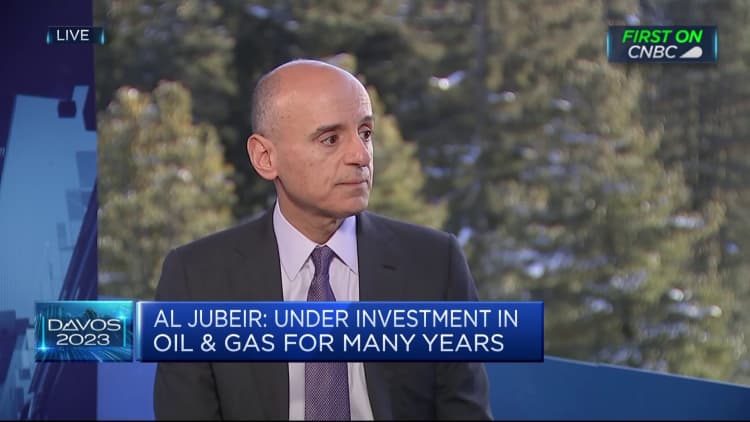
Iran’s announcements in recent months concerning its nuclear development have drawn condemnation and concern from parts of the international community, particularly the West.
But its near neighbor and longtime adversary Saudi Arabia likely feels that concern more acutely.
Iran should relinquish its nuclear program, which violates international agreements, Saudi Minister of State for Foreign Affairs Adel al-Jubeir said Wednesday from the World Economic Forum in Davos.
“I believe that Iran has an obligation to give up its nuclear program. I believe that Iran must be in compliance with the terms of the International Atomic Energy Agency and Iran, if it wants to be a member in good standing of the international community needs to respect international law, needs to respect international order,” al-Jubeir told CNBC’s Hadley Gamble.
In November, the U.N.’s nuclear watchdog confirmed Iran’s announcement that it was enriching uranium to 60% purity at its Fordow plant and planning major expansion of its enrichment capacity.
International Atomic Energy Agency chief Rafael Grossi raised the alarm that “only countries making bombs” are enriching uranium at Iran’s level — that’s just one technical step away from weapons grade, which is 90% purity.
An annotated satellite image of construction at Iran’s Natanz uranium enrichment facility, with analysis by the Middlebury Institute of International Studies at Monterey.
Photo: Planet Labs Inc. | AP
Under the 2015 Iranian nuclear deal — which involved the U.S. and other powers and lifted economic sanctions on Iran in exchange for curbs on its nuclear program — Iran’s uranium enrichment was limited to 3.67%, enough for a civilian nuclear energy program.
Tehran maintains that its nuclear program is for civilian purposes and that having one is its sovereign right.
Months of negotiations between Iran and the Biden administration via European intermediaries came to a halt in September over inability to get past certain points of disagreement. Shortly after, a popular protest movement centered on women’s rights swept Iran and saw its government crack down violently on protesters, drawing international condemnation.
In addition to its nuclear activities, al-Jubeir denounced Iran’s involvement in other countries via its proxy groups like Hezbollah, a Shia political and militant group based in Lebanon with operations all over the region.
“Issues like interference into the domestic affairs of other countries are not acceptable,” al-Jubeir said. “Providing ballistic missiles to terrorist groups is not acceptable … Providing drones to the Houthis in Yemen is also unacceptable.”
Ukraine has blamed Iran for providing Russia with drones, which have been used to attack Kyiv.
Sopa Images | Lightrocket | Getty Images
Iran’s adversaries in the Gulf, Europe and the U.S. say it has provided material support including drones and projectiles to Yemen’s Houthi rebels, who have been locked in a war with Saudi Arabia since the latter invaded Yemen in 2015. Iran is also currently providing lethal drones to Russia for its war in Ukraine.
Tehran denies the allegations that it offers such weapons support, despite abundant evidence that the weapons are from Iran.
Still, al-Jubeir reiterated what he and other Saudi officials have stated in the past: that Riyadh is open to mending ties with Iran if Tehran changes its behavior.
“So we believe that Iran’s actions and policies need to be moderated, we are ready to welcome Iran into the community of nations and deal with it as a good neighbor — if the Iranians are willing to do the same.”
“What I’m saying,” he added, “is that we in Saudi Arabia are willing to meet Iran halfway if the Iranians are willing to change their policies. And we have made that also very clear to them … from our perspective, countries need to adhere to international law, they need to adhere to the principle of non-interference in the internal affairs of other countries, and they need to become good neighbors.”
 EU News Digest Latest News & Updates
EU News Digest Latest News & Updates


